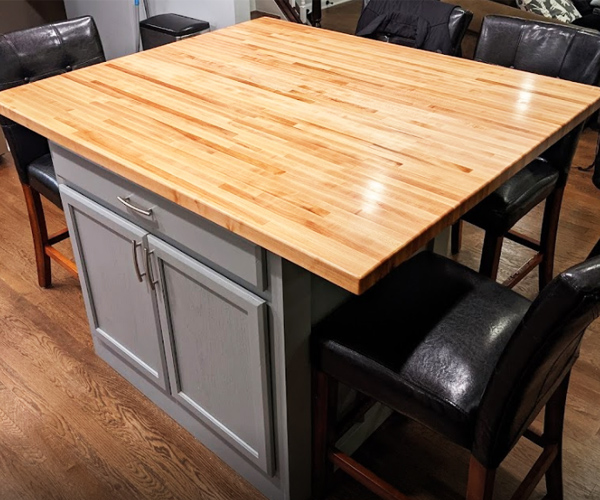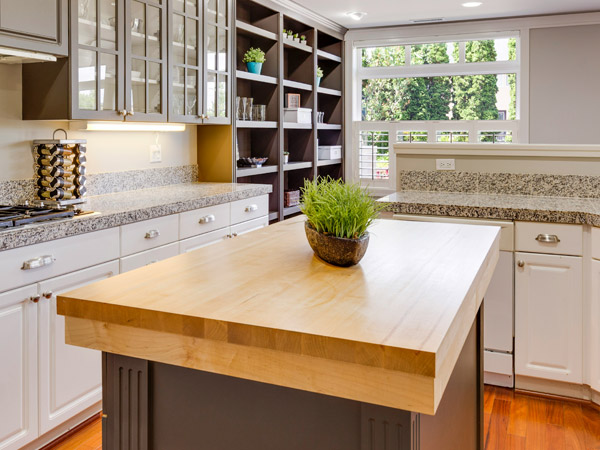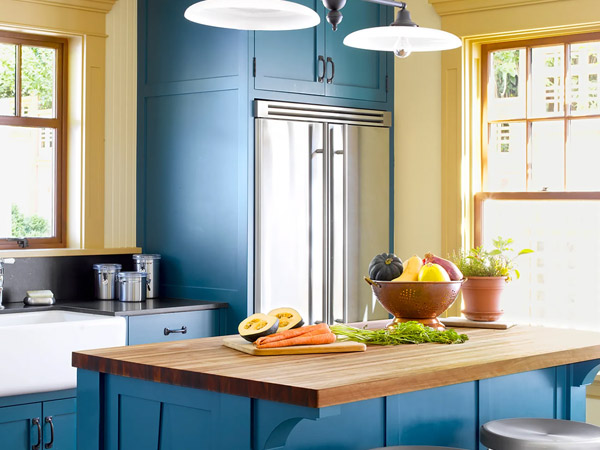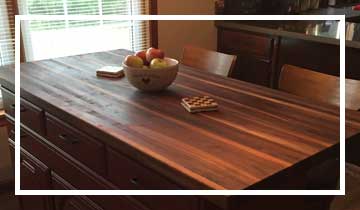The Pros and Cons of Butcher Block Countertops
Butcher block countertops have become a favorite among homeowners seeking a rustic, farmhouse-style kitchen. However, butcher block's appeal extends beyond this aesthetic due to its versatility in wood types, designs, and colors. Offering a solid value, butcher block countertops can also be a satisfying DIY installation project.
In this article, the Forever Joint Tops team will cover everything you need to know about the pros and cons of butcher block countertops.
What Are Butcher Block Countertops?
Butcher block countertops are wooden surfaces made from various types of wood, including maple, hickory, cherry, walnut, and oak. They are crafted in different styles to suit various design preferences. The construction of butcher block typically involves straight cuts of wood glued together to form edge grain slabs.
Blended grain butcher block incorporates rails of different lengths joined together, while end grain butcher block features a checkerboard pattern created by stacking and gluing edge grain boards.
At Forever Joint Tops, we are skilled in crafting butcher block wood surfaces. We've been working with wood for more than 50 years, and have been carefully crafting butcher block products since 2012!
Place Order for Your Butcher Block

Butcher Block Countertop Pros
Whether you choose a lighter colored maple or a deep walnut, below are just some of the benefits of why we think you should opt for a butcher block countertop(s) for your kitchen, dining, laundry, or other living space:
Cost
One of the biggest pros of butcher block countertops is their great pricing. While not as inexpensive as laminate countertops, butcher block is more affordable than natural stone options. For an estimate on cost, please contact Forever Joint Tops. We have customization and pre-made options available, so the price will depend on the type of wood, dimensions, and customization you want.
Versatility
Butcher block countertops are available in a wide range of wood types such as maple, oak, walnut, hickory, bamboo, teak, tigerwood, zebrawood, wenge, beech, and mahogany. You can choose from edge grain, end grain, or blended styles to match your kitchen’s design.

Longevity
With regular maintenance, butcher block countertops can last around 20 years or more, rivaling granite in durability and often outlasting laminate. We recommend having permanenting sealing/finising your butcher block surface to get the longest life possible out of your countertops.
Easy Cleaning
Fortunately, if you're interested in investing in butcher block, you should expect that cleaning it will be easy. In fact, routine cleaning requires only a sponge, warm water, and dish soap. For disinfection, vinegar works well, and stains can be removed with salt and lemon.
Easy Refinishing
If nicks or scratches occur, sanding with fine-grit sandpaper and reapplying food-safe oil can restore the surface. More information on our finishing and care page.
Butcher Block Countertop Cons
There are a handful of possible drawbacks when it comes to investing in butcher block for your kitchen. Here are a few cons to know. If you have questions, please contact the Forever Joint Tops team:
Prone to Stains and Scratches
All butcher block wood is susceptible to stains and scratches. While harder woods are more resistant, butcher block needs regular sealing, especially if used as a cutting surface, to prevent germs, mold, and warping.
Susceptible to Drying Out
If you haven't finished or stained your butcher block, you'll need to apply a mineral oil regularly. If you butcher block is being used to cut and prepare food, you'll need to apply a food-grade mineral oil or a beeswax product. We detail more about mineral oil and beeswax application in our article here.
Not Heat Resistant
Butcher block isn't heat-resistant. Hot items like pots and pans just removed from the stove or oven can scorch the wood, necessitating refinishing to remove burn marks. You'll want to be careful to use hot pads to prevent accidental burning of the wood.
Place Order for Your Butcher Block
Butcher Block Countertop Maintenance & Care
Butcher block countertop installations need consistent maintenance to ensure longevity. After installation, monthly sealing with food-grade oil helps guard against stains, dings, and nicks. Resurfacing, which involves sanding and resealing, may be required every 10 years, depending on wear and tear.
However, if you have had your professional butcher block craftsmen already seal or finish the butcher block for you, you don't have to worry about mineral oil application. We work with Waterlox products to leave your butcher block products long-lasting!
Butcher Block Design Options
Your butcher block countertop design will be determined by the type of wood you choose, as well as whether it's for a residential or commercial application:
- Edge Grain: The most popular style, featuring long boards glued together. It’s one of the least expensive options.
- Face Grain: Uses the top of the wood as the countertop, showcasing the wood’s widest side.
- End Grain: Characterized by a checkerboard look, made from the ends of the wood.
- Blended Grain: Combines interior and exterior rails, offering color variations and often created to reduce waste.
Butcher Block Installation
Installing butcher block countertops can be a DIY project. Precise measuring and cutting are vital, and accounting for wood expansion and contraction with seasonal changes is necessary to prevent warping. Allowing the wood to acclimate to your home before installation can also help maintain its integrity. For more information on butcher block installation, please refer to our guide here.
Related: 6 Things to Know Prior to Installing Butcher Block Countertops
Butcher Block Lifespan
With proper care, butcher block countertops can last around 20 years, or more, similar to a granite countertop's lifespan. They require monthly resealing and occasional resurfacing (if not permanently sealed) to remove deep stains, dings, and scratches.
If you want a versatile, durable surface that can withstand kitchen wear and tear, butcher block countertops are an excellent choice. They are stronger and more resistant to damage than many other surfaces and easier to clean, making them ideal for busy kitchens and families.

The Pros and Cons of Butcher Block Countertops: Conclusion
Butcher block's benefits far outweigh its drawbacks, and butcher block countertops from Forever Joint Tops are a timeless addition and excellent investment for any kitchen.
With proper care, they can last for decades and remain a cost-effective option. Just be mindful of their limitations and avoid using them as cutting boards to preserve their beauty and functionality.
Check out our testimonials here to see what people have to say about our butcher block countertops! For further reading, please take a look at our article on 5 reasons you should choose wood countertops.
Place Order for Your Butcher Block
Contact Us
Forever Joint Tops is your source for customized butcher block countertops, kitchen islands, bar tops, table tops, desktops, and floating shelves. Please contact our experts for more information on our beautiful countertop!
If you have questions for our team, please don't hesitate to contact us here. We are the experts in all things butcher block countertops, tables/desks, kitchen islands, floating shelves, and cutting boards!
Further Reading:
- Wood Desk Ideas
- How to Finish Butcher Block Countertops
- Butcher Block Conditioner Instructions
- 8 Reasons Why Restaurant Butcher Block Tables are a Great Choice!
- Edge Grain vs End Grain Butcher Block Countertops: Which Should You Buy?
- 3 Ideas for How to Enhance Your Kitchen with Butcher Block
- Butcher Block Desk Ideas
- Why You Should Choose Butcher Block for Your Next Home Project

